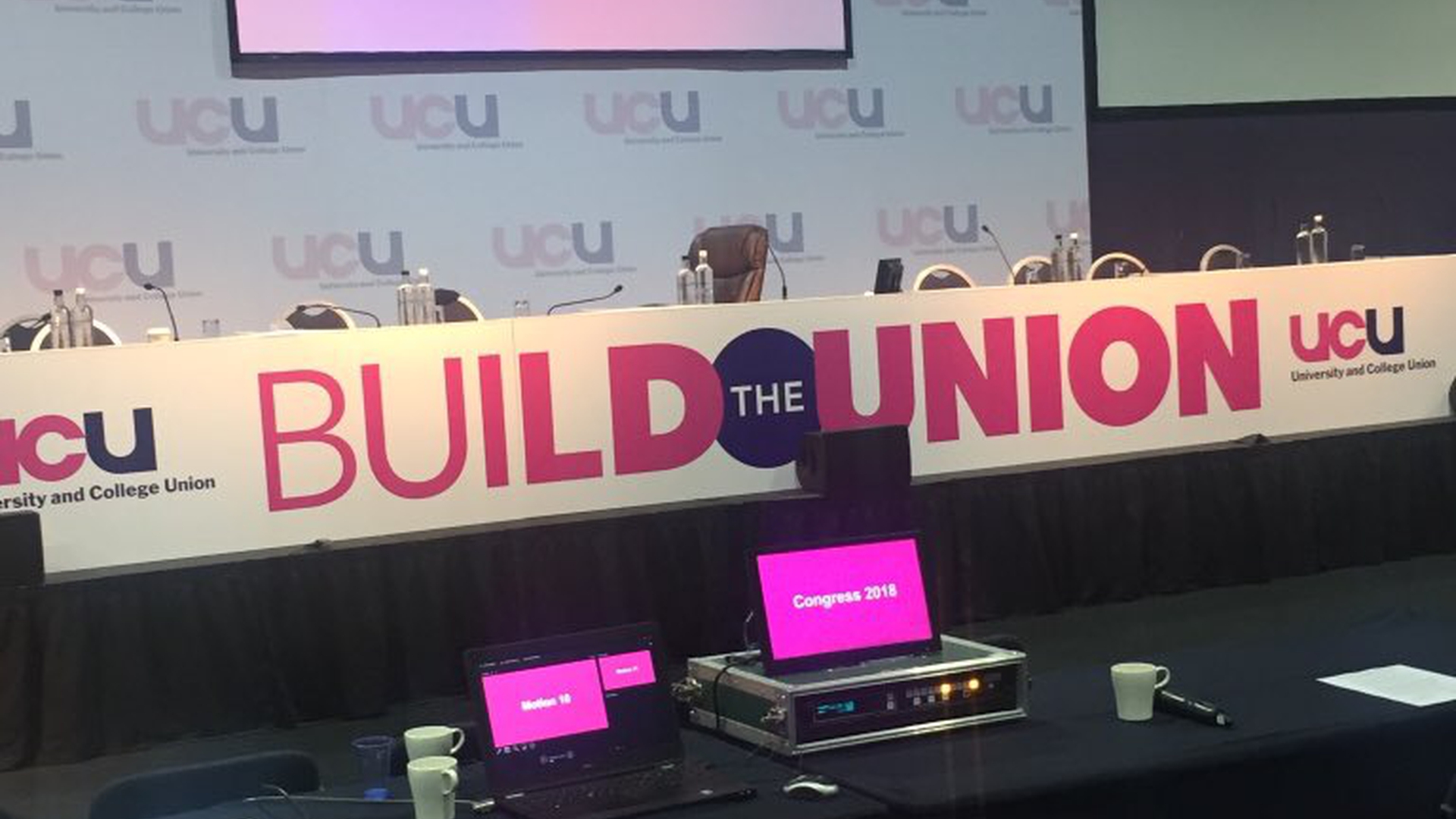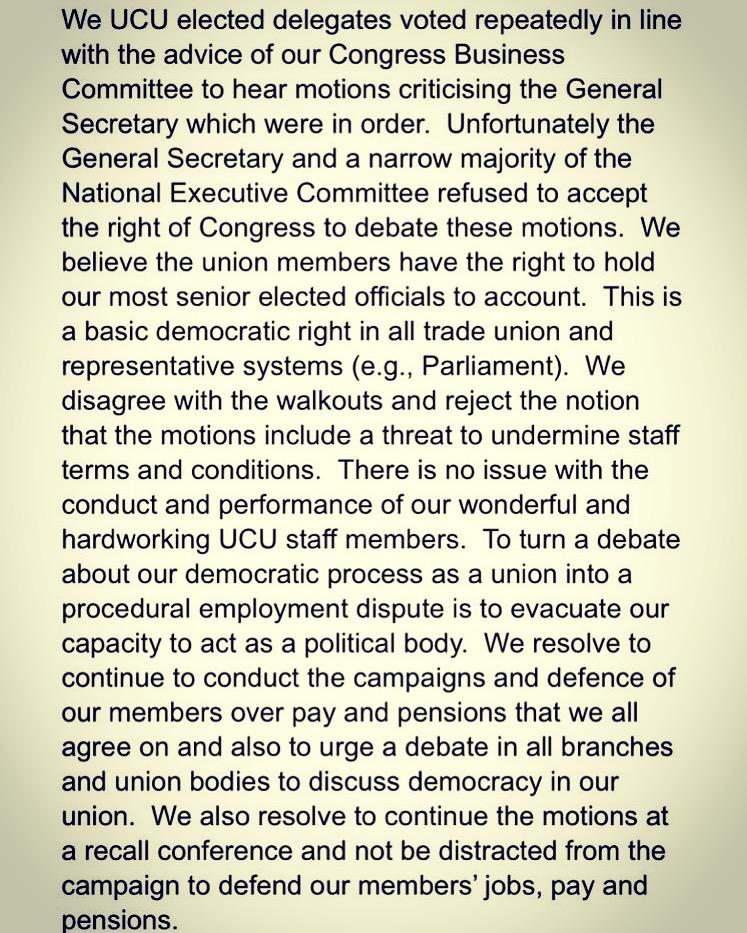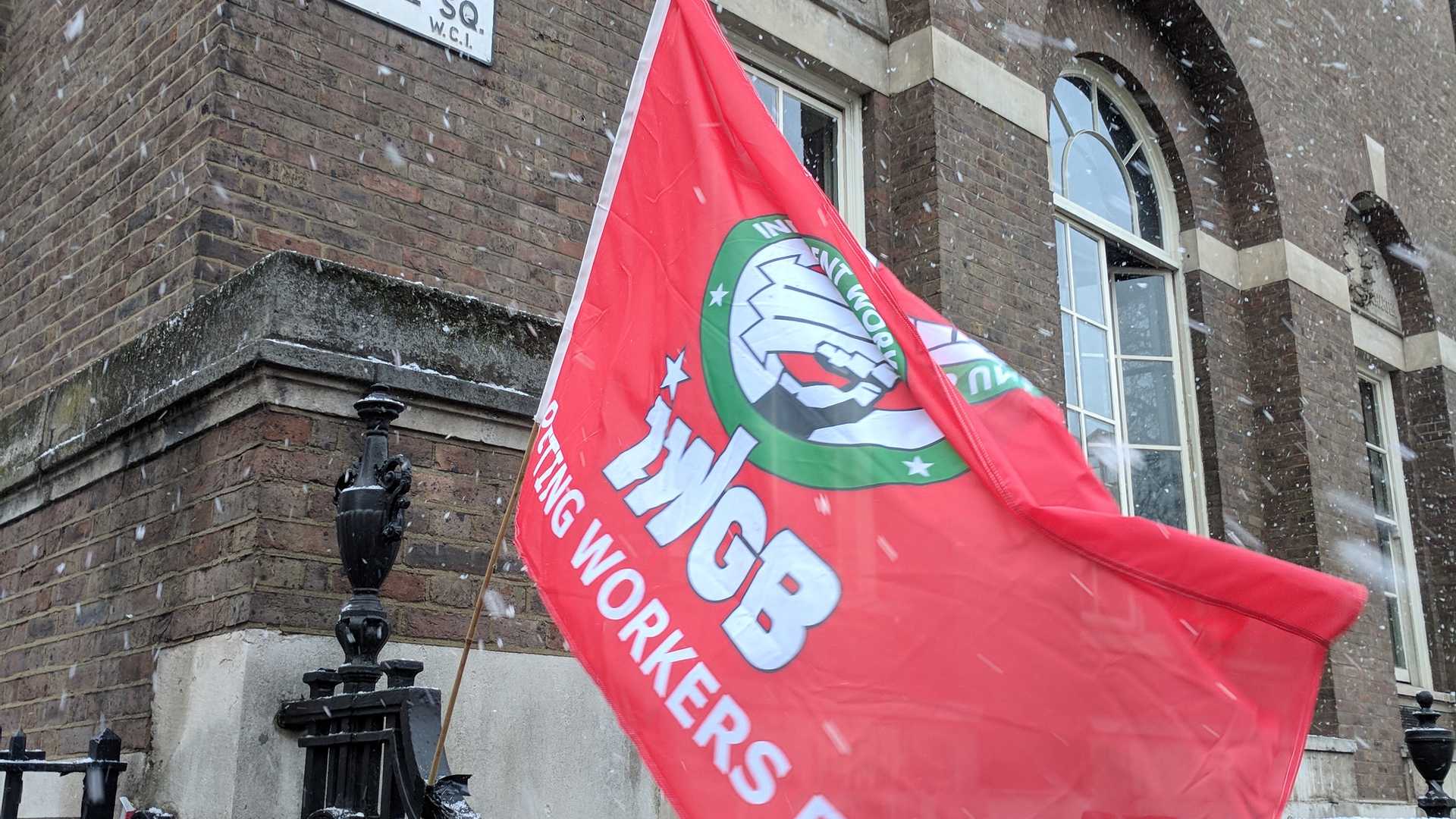
In her address to the 2018 UCU congress, Sally Hunt returned time and time again to the fact that this has been a turn around year for the union. She emphasised the fantastic national strike in pre-92 universities over pensions, inspiring local action in Further Education (FE) over pay, and the 16,000 new UCU members that joined over the last few months and demonstrated once again that to recruit unions need to take action and defend workers’ rights, pay, and conditions.
In many ways the congress reflected this new mood also. In both the FE and Higher Education (HE) sections of the three day gathering, important motions were passed about upcoming pay claims, new approaches to industrial disputes (as embodied in a special commission’s report on the matter), and a series of approaches to closing the gender and race pay gaps, as well as tackling growing casualisation.
In HE, delegates also debated key issues surrounding the recent pension disputes. This included greater democratic accountability for union negotiators through the presentation of their progress to democratic body, the calling of sector conferences to discuss the status of national negotiations in the autumn, and the condemnation of the current USS leadership.
Throughout these discussions, it was striking that the conference was young, included many first time delegates, and that the new mood in the membership was one of a desire for a more assertive, more inclusive, and more active union strategy.
However, all of this now appears to be mere details of a congress that collapsed over the question of democratic accountability.
Indeed, from the very onset of congress four motions were condemned by the union leadership and its senior unelected staff members for contravening the employment right of trade union employees, making them therefore not appropriate for debate at congress. In fact, delegates were told on leaflets distributed by the staff’s Unite branch before entering congress that if these motions were discussed, they would walk out of the congress and effectively shut it down.
The first two motions called for a review into the democracy of the union. This was especially important in the aftermath of how the USS dispute was called off, with many members unhappy about what they perceived to be the leadership’s problematic influencing of the vote. These motions also outlined that they wished to see the review reflect on the role of unelected senior officials of the UCU. This was deemed unacceptable by the staff trade union and the union leadership at conference.
They understood these issues as not being open to debate amongst members and uniquely as employment rights. The fact that many delegates pointed out the importance of union members being able to discuss the allocation of their subs, the accountability of unelected staff, and their influence in the democratic running of their union, or the fact that conference voted by an overwhelming majority to hear the case for the motion did not change the staff union’s position.
The second pair of motions called on a vote of no confidence and a censure, respectively, of the General Secretary, over what the motions considered to be her unprofessional and biased approach to calling off the USS dispute after a majority of branches had called for the strike to remain active. These motions, as was made repeatedly clear at conference and in direct discussions with senior members of staff, did not have the power to sack Sally Hunt not to force her to take any action, but were a way for the delegates to debate and discuss their General Secretary’s actions and hold her to account.
Again, the position was put by the leadership and the staff union that these motions touched upon employment matters and could therefore not be heard. Delegates argued repeatedly over the three days of congress that this was a dangerous interpretation of the basic trade union right of members to hold their leadership accountable, and an unacceptable attack on the democratic functioning of the union. In fact, they voted five times, by an overwhelming majority, to hear the debate on these motions against the demands of the congress chair and the union’s leadership.
The response by senior officials and staff members instead was to shut down the proceedings by walking out every time congress moved to hear the debate for the motions, effectively locking delegates out of their own supreme decision making body. This happened three times over the course of congress, eventually leading to the early termination of congress on Friday.
In response to the walk out, the delegations who had brought these motions to congress - Exeter, KCL, and Sheffield - entered negotiations with the staff unions to attempt to find a compromise. This was successful in the case of the motions demanding a democracy review - which were then later passed successfully - but the staff union announced it would not discuss the motions regarding Sally Hunt. The only available option was for delegates to pull their motions, otherwise conference would be shut down every time it came to debate them.
A few points are worth making here. Firstly, all the motions in question had been received well in advance of congress and ruled perfectly acceptable by the Conference Business Committee (CBC), the body in charge of the standing orders of the congress. Secondly, no attempt was made to raise any concern about any of these motions before conference with the delegations who had submitted them. Thirdly, CBC repeatedly reiterated that the motions had been ruled as legitimate by them and could therefore be discussed. This raised the question of why the leadership was acting in this way or why it hadn’t attempted to resolve the issues beforehand. Fourthly, given the involvement of the union’s leadership as well as senior staff in the walk outs, it is not accurate to describe this as industrial action - as the staff’s Unite branch tried to do. Instead, these were union bosses and their employees blocking the democratic running of a conference rather than allowing debate and criticism of their behaviour to take place. It is also worth questioning how free the junior members of union staff were to act independently from their line managers and employers.
The effect of these repeated lockouts was to transform the congress’ atmosphere from one of serious and constructive debate and strategising to one of increasingly tense political confrontation. What became clear throughout the 5 votes - yes 5! - over whether to hear the motions relating to the GS or not, was that in the face of leadership opposition and black mail, and increasing amount of delegates were voting in favour of debating the motions while also increasingly arguing in favour of them. This in turn appears to have strengthened the leadership’s resolve to torpedo the union’s supreme decision making body rather than allowing open and honest debate about their actions over the last year.
Not only did this paint a picture of a weak and unconfident leadership, it also gave congress the most striking illustration of why greater engagement with our democratic structures (or lack thereof) is urgently needed. Towards the end of congress as delegates were invited to ask direct questions from the top table, a member from the university of Sheffield asked the General Secretary directly whether she was herself opposed to the debate on the motions. The General Secretary sat in silence, refusing to look at the delegate, staring at the chair instead, until she ruled the question out of order. The seconds of absolute silence that elapsed before the chair’s decision were a powerful image of a leadership unable or unwilling to engage and lead.
After the third walk out by the staff and top brass of the union, it was announced that the staff would not return to the congress floor until the motions were withdrawn. Instead, the majority of delegates decided to hold an assembly in the hall and discuss where to go next. Over a hundred people took part in the discussions. The assembly agreed on a statement (below) to be circulated to the membership. It also agreed to encourage UCU branches and regions to meet as soon as possible to discuss these developments with their members and reach unified branch positions. Finally, before the third and final lockout, congress passed a motion calling for a recall congress that would be able to discuss these issues as well as all the motions that were not addressed because of the leadership’s shenanigans.

It is clear that the issue could not be resolved on conference floor and that it will therefore be crucial to resolve these questions within the broader membership. This process has already started. The Communist Party of Britain, which controls the largest faction on the UCU National Executive Committee and is aligned with Hunt, published a statement denouncing the ‘ultra-left’s tactical insanity’. This same line is being repeated in the media already and is likely to be circulated in one form or another, to the membership by the leadership in the days to come. It also claimed that this was a coup by the SWP and anarchist elements in the union. The fact that none of the branches proposing the motions had SWP members in their delegations, that the SWP opposed two of the motions, or that the party could only dream of having 150 members at conference (or even being able to direct that amount of delegates) does not seem to bother those making these claims. After all, why let facts get in the way of a good line?
The task ahead is therefore a serious one. Can the debates started at conference, both in terms of the union’s industrial strategy as well as its democratisation, spread to the union as a whole, and inform a series of debates from local branches to the very top of the union, which lead to a mobilisation of members, a transformation of our structures from top to bottom, and a strengthening of our ability to take on the government and employer’s offensive? Only time will tell. But what is clear is that the aim of the UCU leadership to build the union, recruit new members, and re-energise it has been successful. This new union now demands to be given the necessary tools to address the challenges ahead.
Sally Hunt is right. It has truly been a turn around year. We now need to make sure that our union catches up and turns itself around too.
author
Sai Englert
Subscribe to Notes from Below
Subscribe now to Notes from Below, and get our print issues sent to your front door three times a year. For every subscriber, we’re also able to print a load of free copies to hand out in workplaces, neighbourhoods, prisons and picket lines. Can you subscribe now and support us in spreading Marxist ideas in the workplace?
Read next

A Post-Strike Proposal
by
Jamie Woodcock
/
April 15, 2018

